
starting from a distant point in the Atlantic ocean,
was insolently advancing to attack the whole of Europe, and Asia to boot. For the ocean there was at that time navigable; for in front of the mouth which you Greeks call, as you say,
For all that
we have here, lying within the mouth of which we speak, is evidently a
Now in this island of Atlantis there existed a confederation of kings, of great and marvellous power,
which held sway over all the island, and over many other islands also and parts of the continent; and, moreover, [25b]
of the lands here within the Straits they ruled over Libya as far as Egypt, and over Europe as far as Tuscany.
So this host, being all gathered together, made an attempt one time to enslave by one single onslaught both your
country and ours and the whole of the territory within the Straits. And then it was, Solon, that the manhood of your
State showed itself conspicuous for valor and might in the sight of all the world.
Socrates Critias
9000 is the sum of years since the war occurred,
as is recorded, between the dwellers beyond the pillars of Heracles and all that dwelt within them; which
war we have now to relate in detail. It was stated that this city of ours was in command of the one side and
fought through the whole of the war, and in command of the other side were the kings of the island of Atlantis,
which we said was an island larger than Libya and Asia once upon a time, but now lies sunk by earthquakes and
has created a barrier of impassable mud [109a] which prevents those who are sailing out from here to the ocean
beyond from proceeding further.
[113a] But before I begin my account, there is still a small point which I ought to explain, lest you
should be surprised at frequently hearing Greek names given to barbarians. The reason of this you shall
now learn. Since Solon was planning to make use of the story for his own poetry, he had found, on
investigating the meaning of the names, that those Egyptians who had first written them down had translated
them into their own tongue. So he himself in turn recovered the original sense of each
name and, rendering it
into our tongue, [113b] wrote it down so. And these very writings were in the possession of my grandfather
and are actually now in mine, and when I was a child I learnt them all by heart.
Therefore if the names you
hear are just like our local names, do not be at all astonished; for now you know the reason for them. The
story then told was a long one, and it began something like this.
Like as we previously stated concerning the allotments of the Gods, that they portioned out the whole earth,
here into larger allotments and there into smaller, and provided for themselves [113c] shrines and sacrifices,
even so
and settled therein the children whom he had
begotten of a mortal woman in a region of the island of the following description.
which is said to have been the fairest of all plains and highly fertile; and, moreover,
Thereon dwelt one of the natives originally sprung from the earth, Evenor by name, [113d] with his wife
Leucippe; and they had for offspring an only-begotten daughter, Cleito. And when this damsel was now come
to marriageable age, her mother died and also her father; and Poseidon, being smitten with desire for her,
wedded her; and to make the hill whereon she dwelt impregnable
and these belts were at
even distances on all sides, so as to be impassable for man; [113e] for at that time neither ships nor sailing
were as yet in existence. And Poseidon himself set in order with ease, as a god would, the central island,
and when he had divided all the island of Atlantis into ten portions, he assigned to the
first-born of the eldest sons [114a] his mother's dwelling and the allotment surrounding it, which was
the largest and best; and him he appointed to be king over the rest, and the others to be rulers,
granting to each the rule over many men and a large tract of country. And to all of them he gave names,
giving to him that was eldest and king the name after which the whole island was
called and the sea spoken of as the Atlantic, because
And the name of his younger twin-brother, [114b] who had for his portion the
extremity of the island near the pillars of Heracles up to the part of the country now called Gadeira after the
name of that region, was Eumelus in Greek, but in the native tongue Gadeirus,--which fact may have given its
title to the country. And of the pair that were born next he called the one Ampheres and the other Evaemon;
and of the third pair the elder was named Mneseus [114c] and the younger Autochthon; and of the fourth pair,
he called the first Elasippus and the second Mestor; and of the fifth pair, Azaes was the name given to the
elder, and Diaprepes to the second. So all these, themselves and their descendants, dwelt for many generations
bearing rule over many other islands throughout the sea, and holding sway besides, as was previously stated,
over the Mediterranean peoples as far as Egypt and Tuscany.
Now a large family of distinguished sons sprang from Atlas; [114d] but it was the eldest, who, as king, always
passed on the scepter to the eldest of his sons, and thus they preserved the sovereignty for many generations;
and the
was so immense that the like had never been seen before in any royal house nor
will ever easily be seen again; and they were provided with everything of which provision was
needed either in
the city or throughout the rest of the country. For because of their headship they had a
large supply of imports
from abroad, [114e] and the island itself furnished most of the requirements of daily life,--
metals, to begin with,
both the hard kind and the fusible kind, which are extracted by mining,
and also that kind which is now known only
by name but was more than a name then, there being mines of it in many places of the island,--I mean
It brought forth also in abundance all the
timbers that a forest provides for the labours of carpenters; and of animals it produced a sufficiency, both
of tame and wild.
for there was an ample food-supply
not only for all the other animals which haunt the marshes and lakes and rivers,
[115a] or the mountains or the plains, but likewise also for this animal, which of its nature is the largest and
most voracious. And in addition to all this, it produced and brought to perfection all those sweet-scented stuffs
which the earth produces now, whether made of roots or herbs or trees, or of liquid gums derived from flowers or
fruits.
--the various species of which are comprehended under the name "vegetables"-- [115b] and all the
produce of trees which affords liquid and solid food and unguents, and the fruit of the orchard-trees, so hard
to store, which is grown for the sake of amusement and pleasure, and all the after-dinner fruits that we serve
up as welcome remedies for the sufferer from repletion,--all these that hallowed island, as it lay then beneath
the sun, produced in marvellous beauty and endless abundance. And thus, receiving from the earth all these
products, they furnished forth [115c] their temples and royal dwellings, their harbors and their docks, and
all the rest of their country, ordering all in the fashion following.
First of all they bridged over the circles of sea which surrounded the ancient metropolis, making thereby a road
towards and from the royal palace. And they had built the palace at the very beginning where the settlement was
first made by their God and their ancestors; and as each king received it from his predecessor, he added to its
adornment [115d] and did all he could to surpass the king before him, until finally they made of it an abode
amazing to behold for the magnitude and beauty of its
workmanship. For, beginning at the sea, they bored a channel right through to the
which was
three plethra in breadth, one hundred feet in depth, and fifty stades in length; and thus they made the entrance
to it from the sea like that to a harbor by opening out a mouth large enough for the greatest ships to sail
through. Moreover, through the circles of land, [115e] which divided those of sea, over against the bridges
large enough to give passage to a single trireme; and
this they roofed over above so that the sea-way was subterranean;
Now the island and the circles and
the bridge, which was a plethrum in breadth, they encompassed round about, on this side and on that, with
a wall of stone; and upon the bridges on each side, over against the passages for the sea, they erected
towers and gates. And the stone they quarried beneath the central island all round, and from beneath the
outer and inner circles,
and while quarrying it
they constructed two inner docks, hollowed out and roofed over by the native rock. And of the buildings
some they framed of one simple color,
And they covered with brass, (editor's note - bronze according to Lee)
as though with plaster, all the circumference of the wall which surrounded the outermost circle; and that of the inner one they coated with tin; and that which encompassed the acropolis itself [116c] with orichalcum
which sparkled like fire.
The royal palace within the acropolis was arranged in this manner. In the center there stood a temple sacred to Cleito and Poseidon, which was reserved as holy ground, and encircled with a wall of gold; this being the very spot where at the beginning they had generated and brought to birth the family of the ten royal lines. Thither also they brought year by year from all the ten allotments their seasonable offerings to do sacrifice to each of those princes. [116d] And the temple of Poseidon himself was a stade in length, three plethra in breadth, and of a height which appeared symmetrical therewith; and there was something of the barbaric in its appearance.
as many as were descended from the ten kings, together with
many other votive offerings both of the kings and of private persons not only from the State itself but
also from all the foreign peoples over whom they ruled. And the altar, [117a] in respect of its size and its
workmanship, harmonized with its surroundings; and the royal palace likewise was such as befitted the greatness
of the kingdom, and equally befitted the splendor of the temples.
The springs they made use of, one kind being of cold, another of warm water, were of abundant volume,
Such then was the state of things round about the abode of the kings. And after crossing the three outer harbours, [117e] one found a wall which began at the sea and ran round in a circle, at a uniform distance of fifty stades from the largest circle and harbour, and its ends converged at the seaward mouth of the channel. The whole of this wall had numerous houses built on to it, set close together; while the sea-way and the largest harbour were filled with ships and merchants coming from all quarters, which by reason of their multitude caused clamor and tumult of every description and an unceasing din night and day.
Now as regards the city and the environs of the ancient dwelling we have now wellnigh completed the description
as it was originally given. We must endeavour next to repeat the account of the rest of the country, [118a] what
its natural character was, and in what fashion it was ordered. In the first place, then, according to the account,
and was as a whole
rectangular in shape,
which furnished ample nutriment to all the animals both tame and wild, and timber of various sizes and descriptions, abundantly sufficient for the needs of all and every craft.
[118c] Now as a result of natural forces, together with the labours of many kings which extended over many ages, the condition of the plain was this.
and what it lacked of this shape they made right by means of a trench dug round about it. Now, as regards the depth
of this trench and its breadth and length,
considering that it was made by hand, and in addition to all the other operations, but none the less we must
report what we heard: it was dug out to the depth of a plethrum and to a uniform breadth of a stade, and since
it was dug round the whole plain [118d] its consequent length was 10,000 stades.
and after circling round the plain, and coming towards the city on this side and on that, it discharged them thereabouts into the sea.
of about 100 feet in width, across the plain, and these discharged themselves into the trench on the seaward side, the distance between each being 100 stades. It was in this way that they conveyed to the city [118e] the timber from the mountains and transported also on boats the seasons' products, by
As regards their
manpower,
it was ordained that each allotment should furnish one man as leader of all the men in the plain who were
fit to bear arms; [119a] and the size of the allotment was about ten times ten stades, and the total number
of all the allotments was 60,000; and the number of the men in the mountains and in the rest of the country
was countless, according to the report, and according to their districts and villages they were all assigned
to these allotments under their leaders. So it was ordained that each such leader should
the
sixth part of a war-chariots equipment, so as to make up 10,000 chariots in all, together with two horses
and mounted men; [119b] also a pair of horses without a car, and attached thereto a combatant with a small
shield and for charioteer the rider who springs from horse to horse; and two hoplites; and archers and slingers,
two of each; and light-armed slingers and javelin-men, three of each; and four sailors towards the manning of
twelve hundred ships. Such then were the military dispositions of the royal City; and those of the other nine
varied in various ways, which it would take a long time to tell. [119c] Of the magistracies and posts of honor
the disposition, ever since the beginning, was this. Each of the ten kings ruled over the men and most of the
laws in his own particular portion and throughout his own city, punishing and putting to death whomsoever he
willed. But their authority over one another and their mutual relations were governed by the precepts of
Poseidon, as handed down to them by the law and by the records inscribed by the first princes on a pillar
of orichalcum, which was placed within the temple of Poseidon in the centre of the island; [119d] and
thither they assembled every fifth year, and then alternately every sixth year--giving equal honour to both
the even and the odd--and when thus assembled they took counsel about public affairs and inquired if any
had in any way transgressed and gave judgement. And when they were about to give judgement they first gave
pledges one to another of the following description.
hunted after the bulls with staves and nooses
but with no weapon of iron; and
whatsoever bull they captured they led up to the pillar and cut its throat over the top of the pillar,
raining down blood on the inscription. And inscribed upon the pillar, besides the laws, was an oath
which invoked mighty curses upon them that disobeyed. When, then, they had done sacrifice according
to their laws and were consecrating [120a] all the limbs of the bull,
Such was the magnitude and character of the power which existed in those regions at that time; and this power the God set in array and brought against these regions of ours on some such pretext as the following, according to the story. For many generations, [120e] so long as the inherited nature of the God remained strong in them, they were submissive to the laws and kindly disposed to their divine kindred. For the intents of their hearts were true and in all ways noble, and they showed gentleness joined with wisdom in dealing with the changes and chances of life and in their dealings one with another.
bearing with ease [121a] the burden, as it were, of the vast volume of their gold and other goods; and thus their wealth did not make them drunk with pride so that they lost control of themselves and went to ruin; rather, in their soberness of mind they clearly saw that all these good things are increased by general amity combined with virtue, whereas the eager pursuit and worship of these goods not only causes the goods themselves to diminish but makes virtue also to perish with them. As a result, then, of such reasoning and of the continuance of their divine nature all their wealth had grown to such a greatness as we previously described. But when the portion of divinity within them was now becoming faint and weak through being ofttimes blended with a large measure of mortality, [121b] whereas the human temper was becoming dominant, then at length they lost their comeliness, through being unable to bear the burden of their possessions, and became ugly to look upon, in the eyes of him who has the gift of sight; for they had lost the fairest of their goods from the most precious of their parts; but in the eyes of those who have no gift of perceiving what is the truly happy life, it was then above all that they appeared to be superlatively fair and blessed, filled as they were with lawless ambition and power. And
who reigns by Law,
inasmuch as he has the gift of perceiving such things, marked how this righteous race was in evil plight,
to the end that when chastised they might strike a truer note.
[121c] Wherefore he assembled together all the gods into that abode which they honour most, standing as it does at the centre of all the Universe, and beholding all things that partake of generation and when he had assembled them, he spake thus: ...
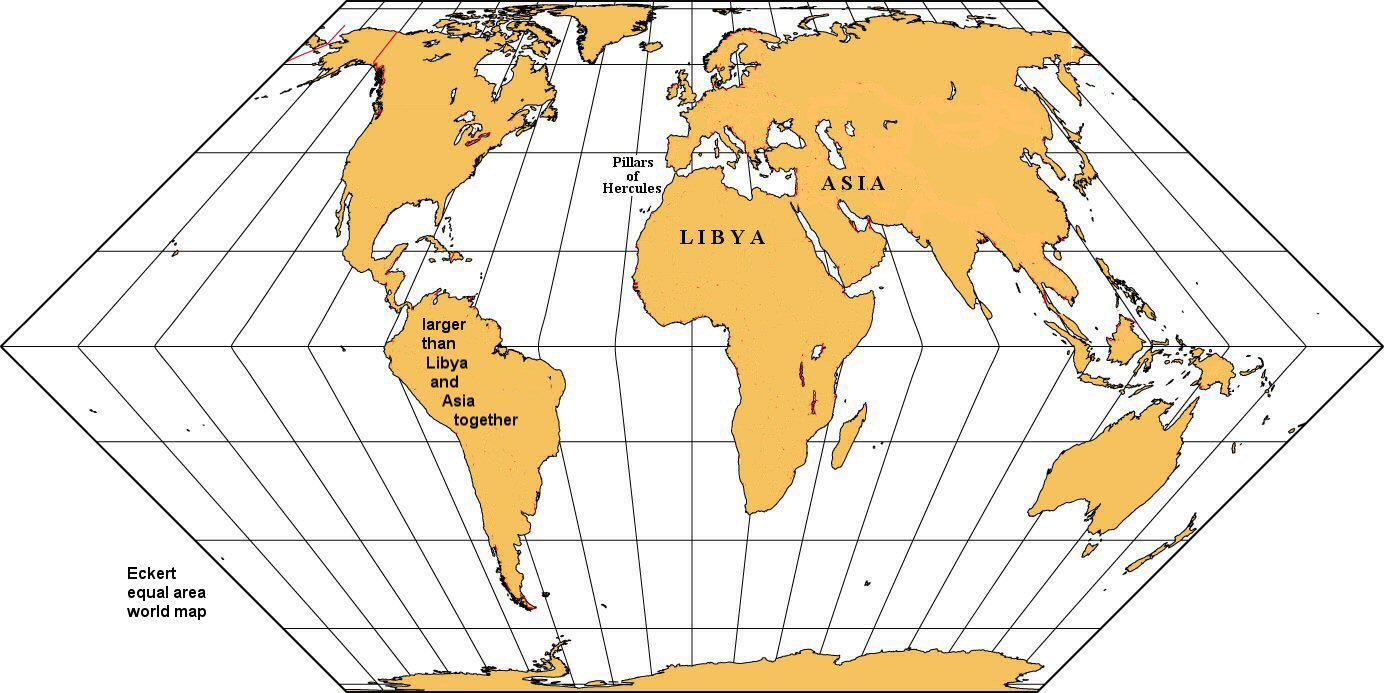
'the pillars of Heracles',
there lay an island which was larger than Libya and Asia
together;
and it was possible for the travellers of that time to

cross from it to the other islands, and from the
islands to the whole of the continent [25a] over against them which encompasses that veritable ocean.

haven having a narrow entrance;

but that
yonder is a real ocean, and the land surrounding it
may most rightly be called, in the fullest and truest sense,
a continent.

For it stood pre-eminent above all [25c] in gallantry and all warlike arts,
and acting partly as leader of the
Greeks,
and partly standing alone
by itself when deserted by all others, after encountering the deadliest perils, it defeated the invaders and reared
a trophy; whereby it saved from slavery such as were not as yet enslaved, and all the rest of us who dwell within
the bounds of Heracles it ungrudgingly set free. But at a later time there occurred portentous
and one grievous day and night befell them, when the whole body of your warriors was swallowed up by
the earth,
and the island of Atlantis in like manner was swallowed up by the sea and vanished; wherefore also the ocean at that
spot has now become impassable and unsearchable, being blocked up by the shoal mud which the island created as it
settled down."
What story should we adopt, Critias, in preference to this? For this story will be admirably suited to
the festival of the Goddess which is now being held, because of its connection with her; and the fact
that it is no invented fable but genuine history is all-important.
[108e] Now first of all we must recall the fact that

editor's note, Agustin de Zarate, 1556, identified Plato's "years" as months
bringing the date of the war down to around 1110BC.
Therefore it was a period beginning with the Trojan War, followed by the attacks of the "Sea Peoples"
and ending with
the defeat of the Persian Empire at the hands of the Greeks.
This history was adapted by Plato and added onto a description of "the Atlantic Island".

Poseidon took for his allotment the island of Atlantis

Bordering on the sea and
extending through the center of the whole island there was a plain,

Editor's note, in the Jowett version, the plain is on the side of the island where the mountains rose
precipitiously out of the sea.
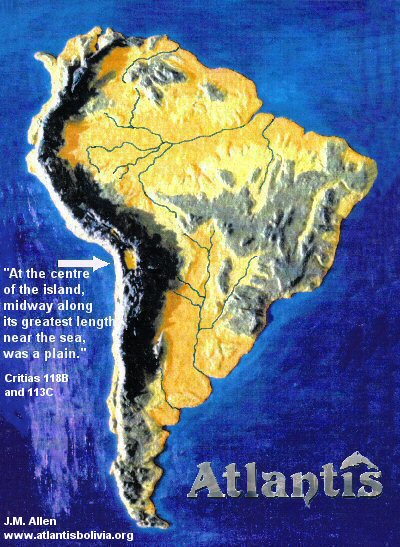
Lee translation 118B... "To begin with,
the region as a whole was said to be high above the level of the sea,
from which it rose precipitously; the city was surrounded by a
uniformly flat plain, which was in turn enclosed by mountains
which came right down to the sea.. This plain was rectangular in
shape, - midway along the greatest length of the island" (Critias 113C)
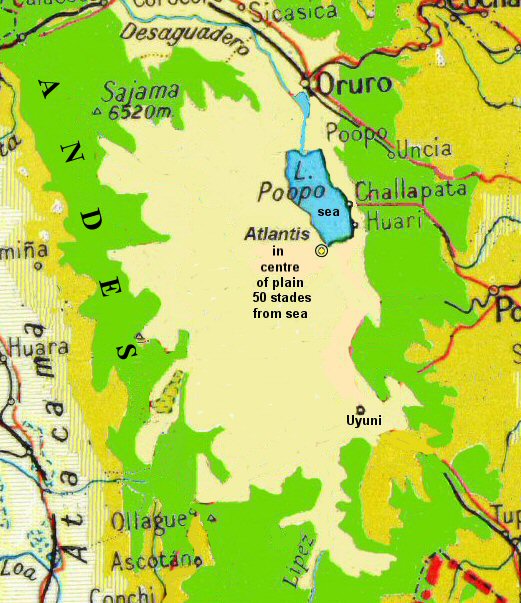
near the plain, over against its center,
(near the
middle of this plain about fifty stades inland [Lee]...)

at a distance of about 50 stades, (from the sea) there stood
a mountain that was low on all sides.


he broke it off all round about; and he made
circular belts of sea and land enclosing one another alternately, some greater, some smaller, two being of
land and three of sea, which he carved as it were out of the midst of the island;


bringing up from beneath the earth two springs of waters, the one flowing warm from its source, the other
cold,

and producing out of the earth all kinds of food in plenty.






And he begat five pairs of twin sons and
reared them up;

the first king who then reigned had the name of Atlas.

wealth they possessed


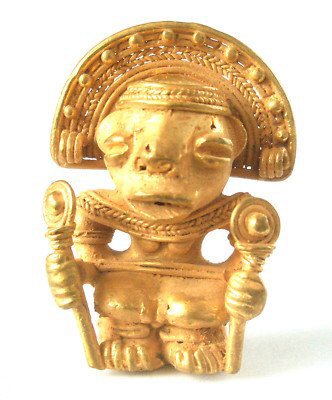
"orichalcum,"
which was the most precious of the metals then known, except gold.


Moreover, it contained a very large stock of elephants;

The cultivated fruit also, and the dry, which serves us for nutriment, and all the other kinds that we use
for our meals

outermost circle,

they opened out a channel leading from circle to circle,

for the lips of the landcircles were raised a
sufficient height above the level of the sea.

City of Atlantis (Artists' conception)

concentric rings of land at Pampa Aullagas



some of it being white, some black and some red; [116b]

in others they wove a pattern of many colors by blending the stones
for the sake of ornament so as to confer upon the buildings a natural charm.

All the exterior of the temple they coated with silver, save only the pinnacles, and these they coated with gold. As to the interior, they made the roof all of ivory in appearance, variegated with gold and silver and orichalcum, and all the rest of the walls and pillars and floors they covered with orichalcum.
And they placed therein golden statues, one being that of the God standing on a chariot and driving six [116e]
winged steeds, his own figure so tall as to touch the ridge of the roof, and round about him a hundred Nereids
on dolphins (for that was the number of them as men then believed); and it contained also many other images,
the votive offerings of private men. And outside, round about the temple,


there stood images in gold of all
the princes, both themselves and their wives,


and each
kind was wonderfully well adapted for use because of the natural taste and excellence of its waters;
and these
they surrounded with buildings and with plantations of trees such as suited the waters; [117b] and, moreover,
they set reservoirs round about, some under the open sky, and others under cover to supply hot baths in the winter;
they put separate baths for the kings and for the private citizens, besides others for women, and others again for horses and all other beasts of burden, fitting out each in an appropriate manner. And the outflowing water they conducted to the sacred grove of Poseidon, which contained trees of all kinds that were of marvellous beauty and height because of the richness of the soil; and by means of channels they led the water to the outer circles over against the bridges. [117c] And there they had constructed many temples for gods, and many gardens and many exercising grounds, some for men and some set apart for horses, in each of the circular belts of island; and besides the rest they had in the center of the large island a racecourse laid out for horses, which was a stade in width, while as to length, a strip which ran round the whole circumference was reserved for equestrian contests. And round about it, on this side and on that, were barracks for the greater part of the spearmen; but the guard-house of the more trusty [117d] of them was posted in the smaller circle, which was nearer the acropolis; while those who were the most trustworthy of all had dwellings granted to them within the acropolis round about the persons of the kings. And the shipyards were full of triremes and all the tackling that belongs to triremes, and they were all amply equipped.
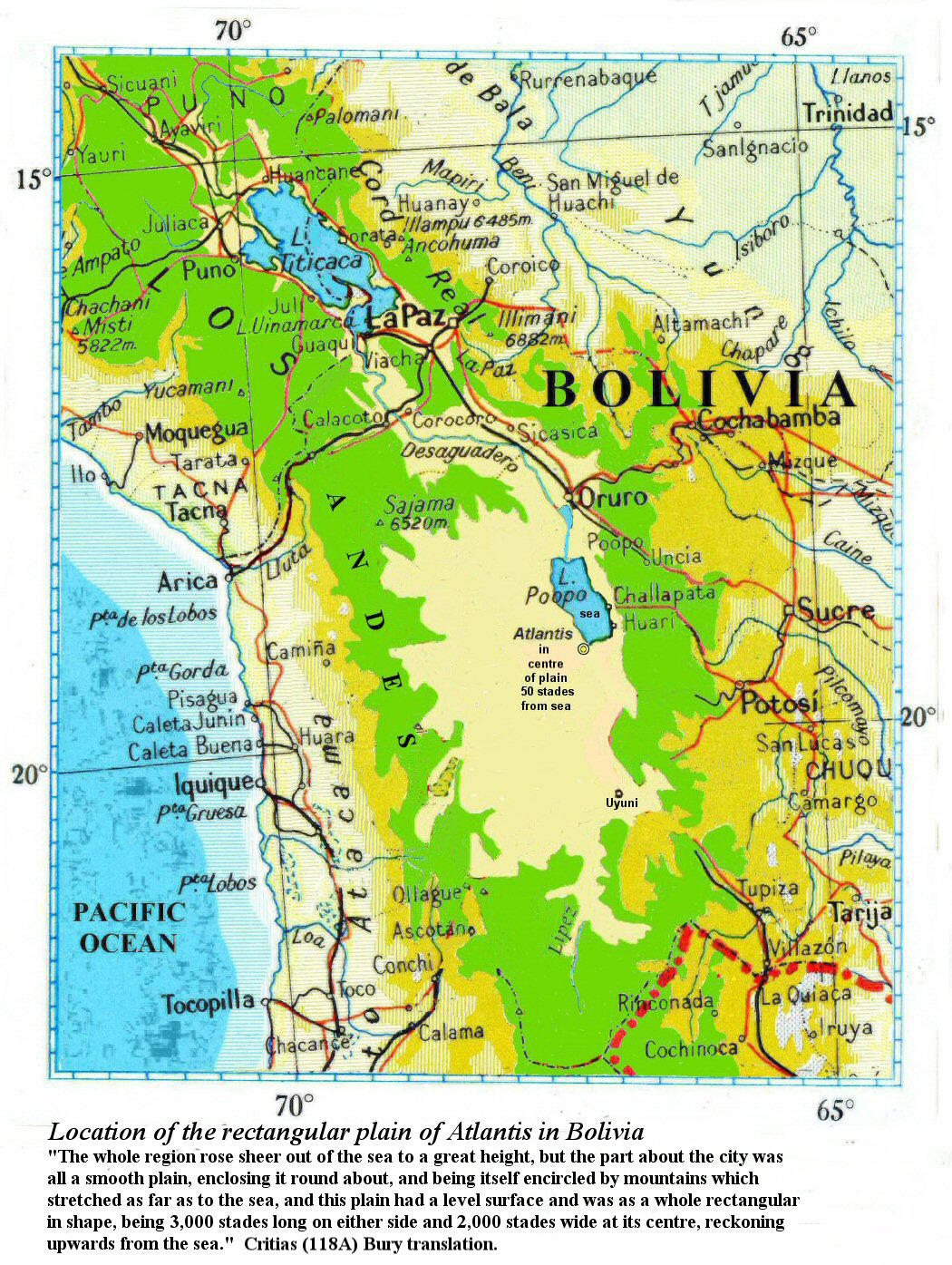
above, Atlantis location map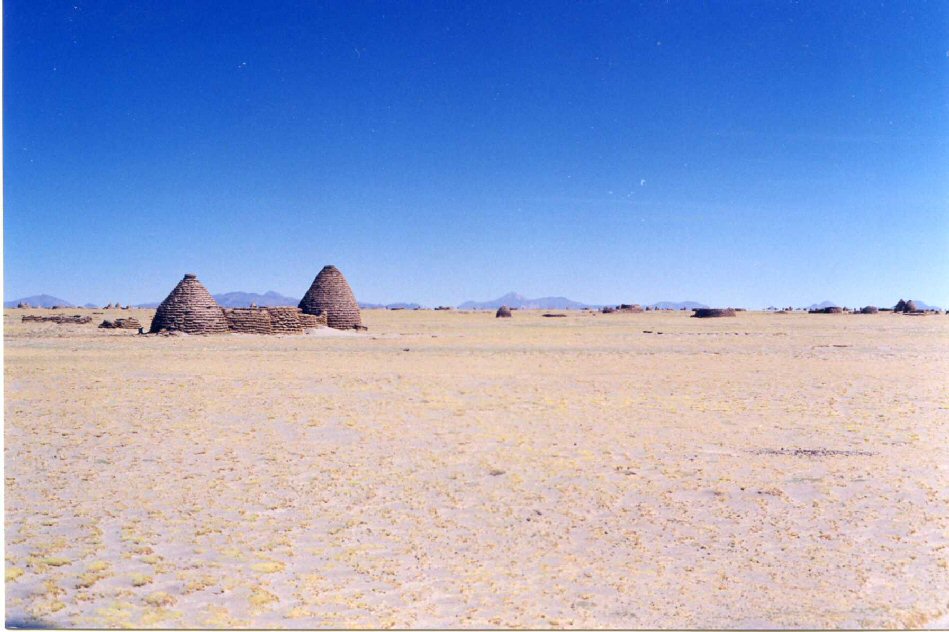
and this plain had a level surface

being 3000 stades long on either side and 2000 stades wide at its centre, reckoning upwards from the sea.
(This plain was rectangular in
shape, measuring three thousand stades
in length and at its midpoint
two thousand stades in breadth [118b] Lee).

And this region, [118b] all along the island, faced towards the South and was sheltered from the Northern blasts.

And the mountains which surrounded it were at that time celebrated as surpassing all that now exist in number, magnitude and beauty;
for they had upon them many rich villages of country folk, and streams and lakes and meadows

It was originally a quadrangle, rectilinear for the most part, and elongated;

it seems incredible that it should be so large as the account states,
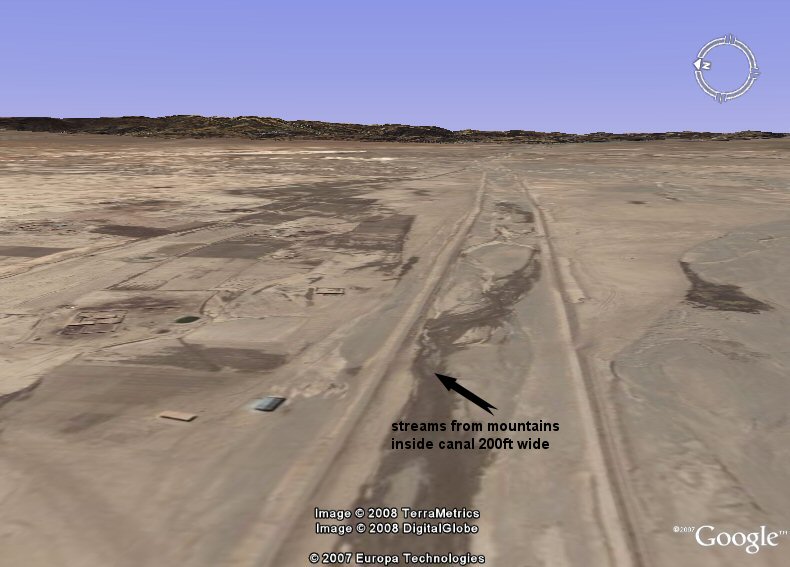
It received the streams which
came down from the mountains

And on the inland side of the city channels were cut in straight lines,

cutting transverse passages from one channel to the next and also to the city.
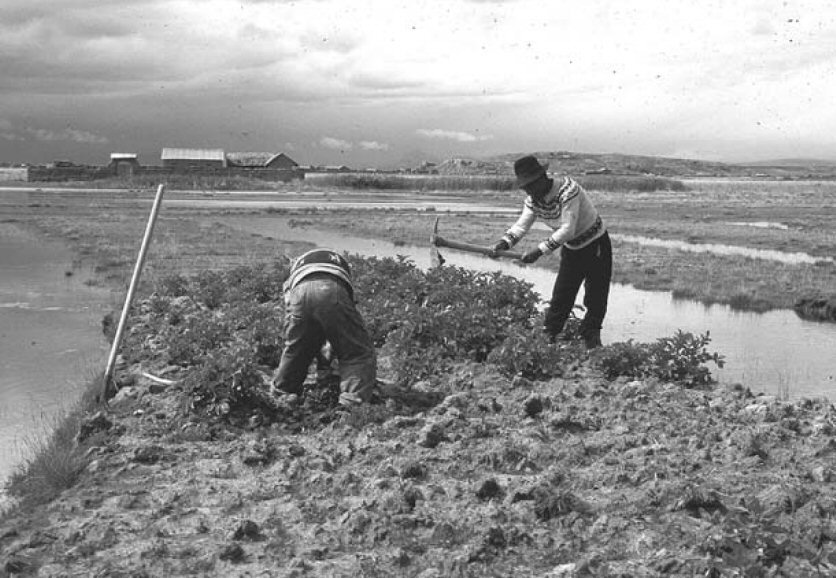
raised beds (Sukka Kollus) when re-introduced, produced two crops per year
And they cropped the land twice a year, making use of the rains from Heaven in the winter, and the waters that issue from the earth in summer, by conducting the streams from the trenches.

provide for war

In the sacred precincts of Poseidon there were bulls at large ;
and the ten princes, being alone by themselves, after praying to the God
that
they might capture a victim well-pleasing unto him, [119e]
editor's note, there was no word in Greek to translate llama

llama capture with staves and nooses
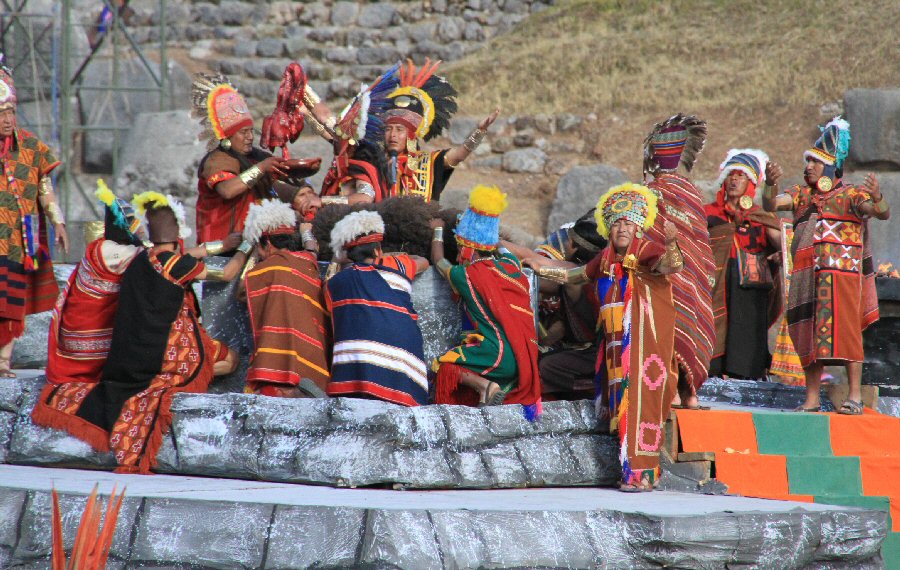
sacrifice of black llama at ceremony of Inti Raimi

they mixed a bowl of wine and poured in on behalf of each one a gout of blood, and the rest they carried to the fire, when they had first purged the pillars round about.
And after this they drew out from the bowl with golden ladles, and

making libation over the fire swore to give judgement
according to the laws upon the pillar and to punish whosoever had committed any previous transgression; and,
moreover, that henceforth they would not transgress any of the writings willingly, nor govern nor submit to any
governor's edict [120b] save in accordance with their father's laws. And when each of them had made this invocation
both for himself and for his seed after him, he drank of the cup and offered it up as a gift in the temple of the
God; and after spending the interval in supping and necessary business,

when darkness came on and the sacrificial
fire had died down,
all the princes robed themselves in most beautiful sable vestments, and sate on the ground
beside the cinders of the sacramental victims throughout the night, extinguishing all the fire that was round
about the sanctuary; [120c] and there they gave and received judgement, if any of them accused any of committing
any transgression. And when they had given judgement, they wrote the judgements, when it was light, upon a golden
tablet, and dedicated them together with their robes as memorials. And there were many other special laws
concerning the peculiar rights of the several princes, whereof the most important were these: that they
should never take up arms against one another, and that, should anyone attempt to overthrow in any city
their royal house, they should all lend aid, taking counsel in common, like their forerunners, [120d]
concerning their policy in war and other matters, while conceding the leadership to the royal branch of
Atlas; and that the king had no authority to put to death any of his brother-princes save with the consent
of more than half of the ten.

Consequently they thought scorn of everything save virtue and lightly esteemed their rich possessions,

Zeus, the God of gods,

and desired to inflict punishment upon them,




